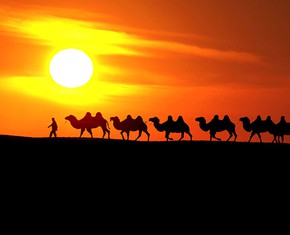The views expressed in our content reflect individual perspectives and do not represent the authoritative views of the Baha'i Faith.
In May of 1912 Abdu’l-Baha gave a talk in a Baptist church in Harlem, where he defined the greatest attainment in the world of humanity.
So, before we look at what he said (don’t peek!), here’s a multiple-choice quiz: what do you think is the greatest attainment in the world of humanity?
A. Leading a great nation
B. Winning the Nobel Prize
C. Inventing a new technology
D. Becoming the world’s wealthiest philanthropist and humanitarian
E. Curing a deadly disease
F. Making transformative art
G. None of the above
Without a doubt, answers A through F represent major accomplishments, but for Abdu’l-Baha, G—none of the above—represents the correct answer to this particular question. Here’s what he said:
The greatest attainment in the world of humanity is nearness to God. Every lasting glory, honor, grace and beauty which comes to man comes through nearness to God. All the Prophets and apostles longed and prayed for nearness to the Creator. How many nights they passed in sleepless yearning for this station; how many days they devoted to supplication for this attainment, seeking ever to draw nigh unto Him! – Abdu’l-Baha, The Promulgation of Universal Peace, p. 147.
Nearness to God? Did you even come close to guessing that answer? When Abdu’l-Baha says “Every lasting glory, honor, grace and beauty which comes to man comes through nearness to God,” what do you think he means?
Perhaps, by using the word “lasting,” he’s trying to tell us that all worldly fame, fortune and accomplishment inevitably fades away—that the only truly permanent attainments are the spiritual attributes and qualities we can carry with us into the next phase of existence.
After all, two things are absolutely certain: death; and the fact that death means we leave everything physical here on Earth. Without question, then, everything is temporal except the soul.
Abdu’l-Baha started his talk in that Baptist church in Harlem by saying “As I entered the church this evening, I heard the hymn ‘Nearer my God, to Thee.’” Then, after the opening paragraph, he told the congregation:
But nearness to God is not an easy accomplishment. During the time Jesus Christ was upon the earth mankind sought nearness to God, but in that day no one attained it save a very few—His disciples. Those blessed souls were confirmed with divine nearness through the love of God. Divine nearness is dependent upon attainment to the knowledge of God, upon severance from all else save God. It is contingent upon self-sacrifice and to be found only through forfeiting wealth and worldly possessions. It is made possible through the baptism of water and fire revealed in the Gospels. Water symbolizes the water of life, which is knowledge, and fire is the fire of the love of God; therefore, man must be baptized with the water of life, the Holy Spirit and the fire of the love of the Kingdom. Until he attains these three degrees, nearness to God is not possible. – Ibid.
Abdu’l-Baha’s talk gives us some context for one of the basic requirements of a Baha’i life: the attainment of the knowledge of God. It also suggests how that knowledge might be possible, given the paradoxical fact that the Baha’i teachings tell us God is unknowable.
If water symbolizes knowledge, and fire symbolizes love, we obviously need to engage our knowing and loving capacities to draw our souls closer to their Source.
He who has the consciousness of reality has eternal life—that lamp which can never be extinguished … A wise man sees no satisfaction in the material world; he is not content to be one of the creatures. In the world of divine effulgence he finds eternal life and becomes aflame with the fire of the love of God, the great source of life of the immortal kingdom and his head is adorned with a crown of eternal jewels. – Abdu’l-Baha, Divine Philosophy, pp. 57-58.
Abdu’l-Baha’s book Some Answered Questions offers a fascinating, contemplation-worthy analogy on this subject: “The wealth of the next world consists in nearness to God.” – p. 266.
You May Also Like
Comments

















Does 'worship' mean 'pray'? Does the word mean also love and serve?